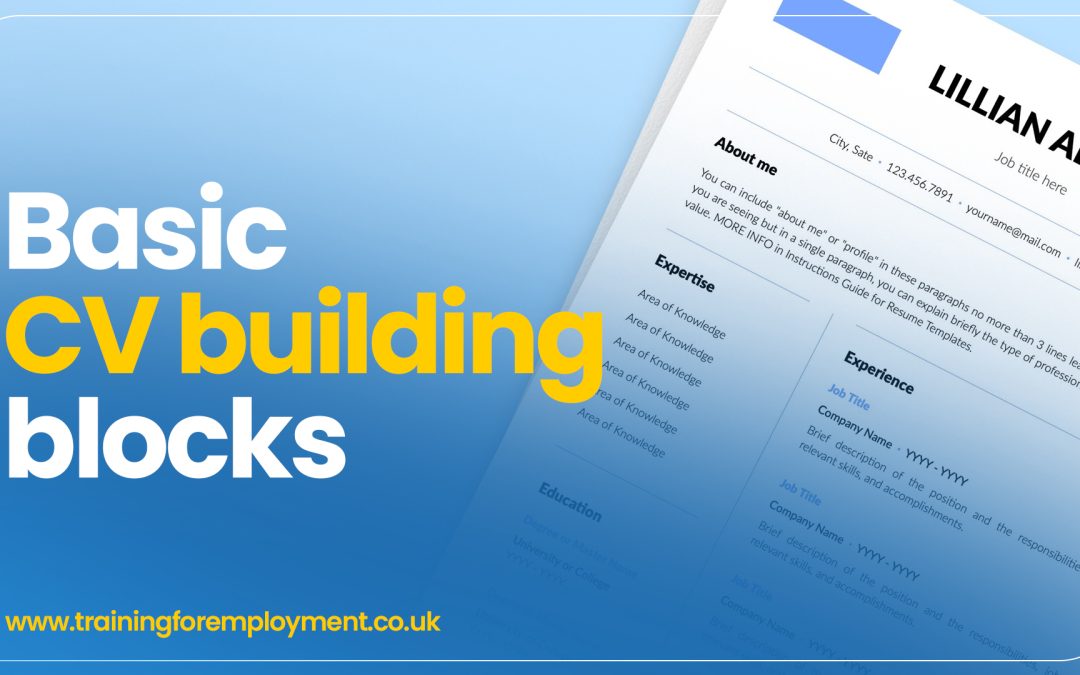Your CV can hold a lot of weight. For just a piece of paper, it can make the difference between landing an interview or not. A good one, built with the right CV building blocks, can get you considered for jobs way beyond your experience. Bad ones can slam hundreds of doors in your face without you knowing.
Needless to say, getting it right is important.
So we’ve compiled some CV building blocks essentials. Every sector requires some tweaks here and there, which you’ll have to identify on your own (in fact, you should always alter your CV to your chosen job application, as an all-purpose one is likely to be too generic), but for the most part these are the basics you’ll need to cover.
Basic information: Essential CV Building Blocks
Top of the list on every CV you have should be your basic information. You may want to get right on with describing your many skills and qualifications, but you need to give potential employers your essential info first. Include:
- Name
- Address
- Phone Number
- Email address
This way, when sorting through CVs, employers can find you quickly.
Personal Statement: Key CV Building Blocks
Next up comes a short, punchy paragraph about you. Keep it tight and focused on your professional life. Mention which sector you want to work in, and why. There is no need to go into detail here, as your covering letter can deal with that. Just set yourself up for why you think you are worthy employing.
Work Experience
The thing employers care most about is experience, not necessarily qualification. Unless this is your first job out of education, the qualifications will be taken for granted if you already have experience in the industry.
Here, list every job that applies in some way to the job you are applying for. Start with your most current position, and then work backwards. Include:
- Company name
- Role
- Location
- Start and end dates of employment
To keep things compact, use bullet points. If you have had five or more jobs, list the most recent five, and then only include any that have direct link with the job in question. If it starts to look to crammed (ideally, your CV should be no longer than two sides of A4), start cutting the least important ones.
Skills and Qualification
In a similar fashion to work experience, list out your qualifications in bullet point form. State the level (degree, a-level, GSCE, etc.), and include:
- University/College/School
- Subjects
- Grade
Again, brevity is key – only mention the highest grade you achieved in any one subject. If you have an A-Level and a GSCE in ICT for example, only mention the A-Level.
Skills can be a little more specialised. Project management isn’t a skill you can be graded for, but if you have lead projects before, it is a key skill to mention. So write down any skill that could be useful in the job, and back it up with one or two sentences of proof where needs be (a driving license, for example, doesn’t need explanation, but evasive driving does).
Hobbies and Interests
At this point, your CV is likely to have either secured you an interview or placed you further down the pecking order. When it comes to hobbies and interests, their primary purpose in CV building is to help create a well-rounded picture for potential employers. While what you enjoy doing in your spare time may not directly influence hiring decisions, shared interests can spark a connection, making employers more inclined to engage with you. That’s always a positive outcome, but remember to keep this section concise.
References
If you have a lot of room to spare, you can put personal references on the CV. But usually, it will be enough to say “References can be provided upon request.” Know in advance who you want talking for you. Former managers or mentors are great, but make sure they are on your side before you use them. A current employer, worried about losing you, may give out a negative reference.
These are the basics. The main thing to remember is brevity. Long-winded CVs are a nightmare for employers presented with thousands of applicants. Focus on getting your point across as quickly as possible. When reading, think, “Can I get this point across quicker?” Keep it tight, cover all the essential CV building blocks, and if you have relevant security courses or certifications, include those to stand out further. With a bit of luck, you’ll start getting some callbacks.




